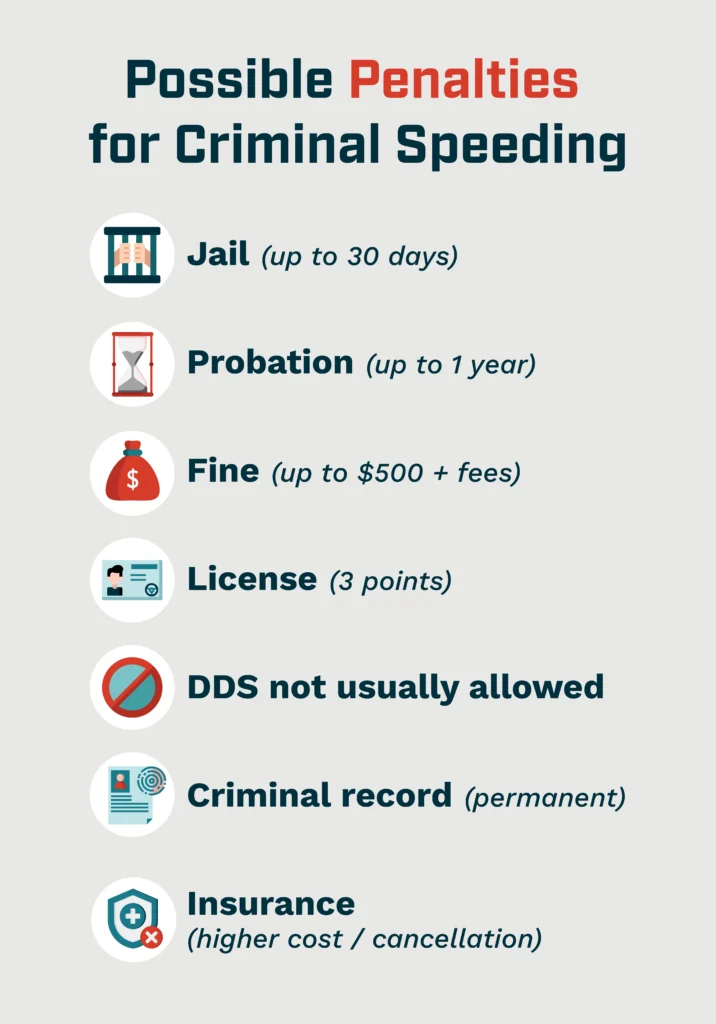
Posted on September 17, 2025 in assault & violent crimes
Under Arizona law, there are two kinds of speeding: exceeding reasonable and prudent speed and excessive speeding, which is commonly known as criminal speeding. Criminal speeding is the more serious offense and is a Class 3 misdemeanor that stays on your criminal record.
In this post, we cover what criminal speeding is in Arizona, the penalties for criminal speeding, and defenses if you are charged with criminal speeding.
If you have been charged with criminal speeding in Arizona, Rosenstein Law Group can represent you and work to obtain the best possible outcome. Call us at (480) 248-7666 to speak with one of our experienced Arizona criminal defense attorneys.
The statute that defines criminal speeding in Arizona is Arizona Revised Statutes (ARS) Section 28-701.02. Here is the text of the statute:
Excessive speeds; classification
A. A person shall not:
1. Exceed thirty-five miles per hour approaching a school crossing.
2. Exceed the posted speed limit in a business or residential district by more than twenty miles per hour, or if no speed limit is posted, exceed forty-five miles per hour.
3. Exceed the posted speed limit by more than twenty miles per hour in other locations.
B. A person who violates subsection A of this section is guilty of a class 3 misdemeanor.
C. A person who is charged with a violation of this section may not be issued a civil complaint for a violation of section 28-701 if the civil complaint alleges a violation arising out of the same circumstances.
As the statute lays out, there are three situations in which a police officer can arrest you for criminal speeding.
Designated school zones in Arizona, including school crossings, have a 15-miles per hour speed limit when children are present. But if you are coming at a school crossing at 35 miles per hour or faster, this is enough to warrant a criminal speeding charge.
The question in this case is how far from the school crossing you need to be for the law enforcement officer to conclude that you are “approaching” it for purposes of applying the law.
There is no specific distance under Arizona law for when you are considered to be approaching a school zone crossing. So, some discretion exists in the officer’s judgment. On the other hand, if the officer applies this part of the statute too far from the school crossing, then you may have a defense against the charge.
Business districts typically have posted speed limits of 30 or 35 miles per hour, and residential districts ordinarily have a maximum speed limit of 25 miles per hour. The threshold to be charged with criminal speeding, then, is ordinarily between 51 to 56 miles per hour or faster in a business district, and 46 miles per hour or faster in a residential district.
If you are in a business or residential district and there is not a posted speed limit, then 46 miles per hour or faster is the threshold for a criminal speeding violation.
Arizona law does not specifically define what another location is for criminal speeding purposes. We can deduce, however, that any area that does not have a school crossing, or is not a residential area or a business district, will generally fall under this category.
Examples include:
The first thing to know about a criminal speeding violation is that it is not the same as a civil speeding infraction. A civil offense mainly involves paying a fine. A criminal speeding ticket is a considerably more serious, beginning with the fact that it results in a Class 3 misdemeanor criminal conviction on your record.
Class 3 misdemeanor penalties include:
But that is not all:
Common defenses to a civil speeding ticket are also ones you can use when defending against criminal speeding charges.
In the specific context of criminal speeding, you may have several defenses. For example, if the charge involves approaching a school crossing, you might argue that the officer’s discretion was too broadly applied, that 35 miles per hour was not excessive under the circumstances, or that the statutory standard is unconstitutionally vague.

As we have seen, a criminal speeding conviction is a serious matter that can have lasting consequences. If you have the right legal representation, you can improve your chances of having the charge against you reduced to a civil ticket, or to be able to attend DDS, or to be acquitted at trial of the charge.
At the Rosenstein Law Group, our experienced Arizona criminal defense lawyers have represented countless clients charged with traffic offenses, including criminal speeding charges. If you have an attorney from our law firm represent you, you will likely not have to attend all of the court proceedings in the case against you, including the initial appearance before the court.To schedule a free initial consultation with a qualified Arizona criminal speeding defense attorney, call us at (480) 248-7666 any time, day or night. You can also reach us online to speak with one of our criminal defense specialists and set up a free case evaluation.